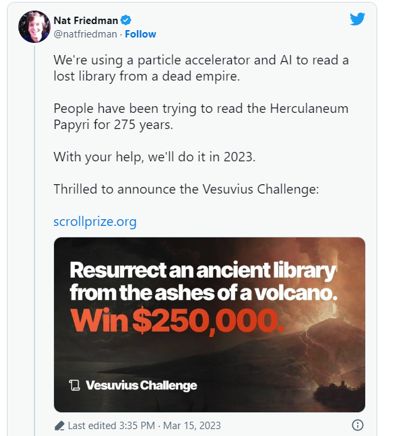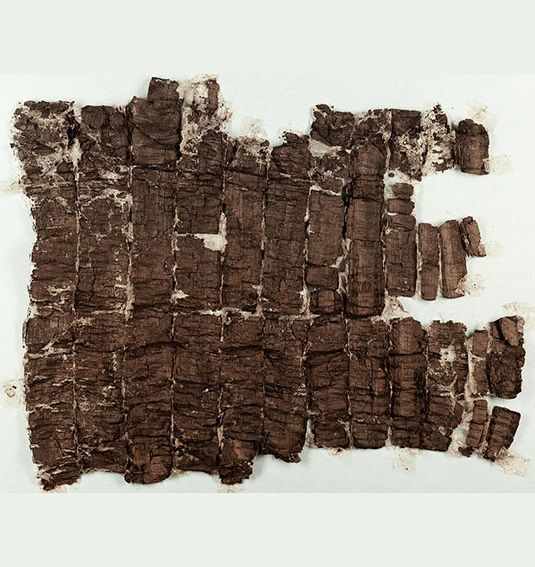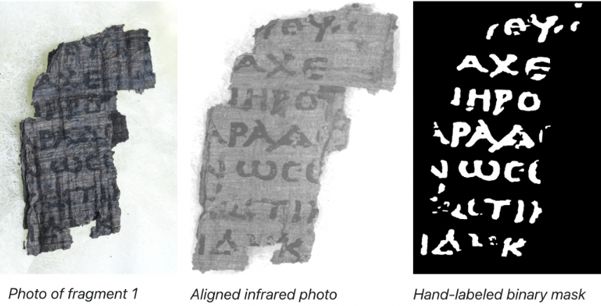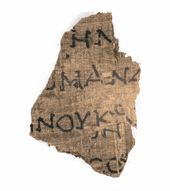| Can ML Unlock The Secrets of the Herculaneum Scrolls? |
| Written by Sue Gee |
| Sunday, 02 April 2023 |
|
The Vesuvius Challenge, which asks teams to read four passages from inside two unopened scrolls buried under twenty meters of mud and ash when Mount Vesuvius erupted in 79 AD appears to be a herculean task. With a prize pool of over a million dollars it offers substantial cash prizes and just taking part seem a rewarding thing to do. The Vesuvius Challenge was announced on Twitter by Nat Friedman on March 15th with a prize pool of $250,000. Within a matter of hours the prize money had quadrupled and individuals and teams registered for what has to be seen as an ambitious attempts to apply machine learning and computer vision to what had been an intractable problem - discovering the contents of two of the Herculaneum Papyri.
According to the website: The Grand prizes of $700,000 will be awarded to the first team to render either one of the fully-scanned scrolls readable by 11:59pm Pacific, December 31st 2023. Submissions must be in the form of images of the virtual unrolled papyrus, showing visible and legible text and will need to be accompanied by a detailed technical description of how the solution works. The rubric also has the clause
The contest builds on the work already done by Dr Brent Seales, a computer scientist at the University of Kentucky and one of the co-founders of scrollprize.org. Back in 2015 using X-ray tomography and computer vision he and his team "read" the En-Gedi scroll that had been discovered in a carbonized state in the Dead Sea region of Israel without opening and revealed that it contained text from the book of Leviticus. In the case of the Herculaneum Papyri the task of reading the contents is more challenging: unlike the denser inks used in the En-Gedi scroll, the Herculaneum ink is carbon-based, affording no X-ray contrast against the underlying carbon-based papyrus. To tackle the problem of detecting the ink in the 3D X-ray scans a subsidiary contest is already underway with a deadline of June 14. With a prize pool of $100,000 to be distributed to 10 winners, it is hosted on Kaggle where you'll find this explanation: The ink used in the Herculaneum scrolls does not show up readily in X-ray scans. But we have found that machine learning models can detect it. Luckily, we have ground truth data. Since the discovery of the Herculaneum Papyri almost 300 years ago, people have tried opening them, often with disastrous results. Many scrolls were destroyed in this process, but ink can be seen on some broken-off fragments, especially under infrared light.
The contest dataset contains 3d x-ray scans of four such fragments at 4µm resolution, made using a particle accelerator, as well as infrared photographs of the surface of the fragments showing visible ink. These photographs have been aligned with the x-ray scans. We also provide hand-labeled binary masks indicating the presence of ink in the photographs:
The most immediate deadline for the Vesuvius Challenge is a matter of days away - April 11, 2003 - with three "open source prizes", each worth $2,000 and with a "fun surprise". Announcing these prizes the website states: All of us organizing the Vesuvius Challenge are big believers in open source and incremental progress. We want to encourage building in the open and benefiting the whole community — something that is typically disincentivized in a competition format. That’s why we are introducing “open source prizes”. These are small prizes that may be awarded for any open source or publicly available contributions: software, documentation, research notes, Kaggle notebooks, anything goes. See here for details. To know more about the Vesuvius Challenge, its website has the background and there's even more included in this Q&A session:
There's a lot of enthusiasm for the Vesuvius Challenge and it's easy to see why. It's a real opportunity to use the latest technology to unravel secrets from a long buried past. More InformationVesuvius Challenge - Ink Detection (Kaggle) Related ArticlesVesuvius Challenge - Progress and Prizes Identifying Birdsong - A Kaggle Machine Learning Competition Kaggle Enveloped By Google Cloud
|
| Last Updated ( Thursday, 12 October 2023 ) |




